|
KAITE TSUKUTTE ASOBERU - DEZAEMON
|
|
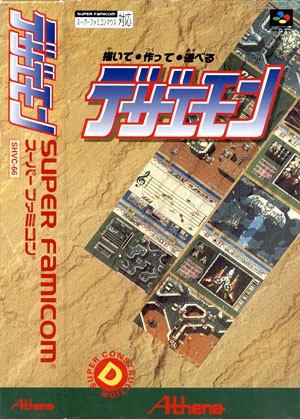
|

|
|
デザエモン
© Athena 1994
Release: 1994-09-20 (¥12900)
Cartridge SHVC-66
Shooter / Editor Game
|
Dezaemon is a vertical shooter editor developed and published by Athena,
and it is the second title from the long-running and unique series of the same name. This
unique game comes with an already build-in vertical shooter called "Daioh Gale", but
this is only half of what's on offer here. Dezaemon allows the player to create his
own vertical shooters - to draw all the in-game sprites, design the levels, edit enemy attack
patterns, customize power-ups and even compose the music tracks. Daioh Gale somehow shows
what the editor is capable of and features six levels, waves of all king of enemy ships,
power-ups, special effects and large bosses - and all aspects of this built-in game can be
used as a template, changed and tailored with the editor. Dezaemon is all in Japanese
though, so anyone not familiar with the language should expect a bit of trial and errors - but the
overall interface is almost completely free of text and relies on easily recognizable and
comprehensible icons and menus.
|
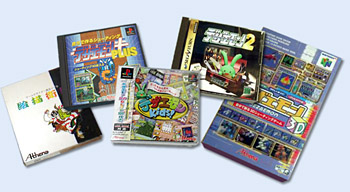 The Dezaemon game series is little known in the west, but it has been a
long-running and respected series in Japan since the 1990s. The first game was
released for the Famicom in 1991.
A sequel (or enhanced version) followed in 1994
for the Super Famicom (version tested here). Dezaemon Plus was then released
in 1996 for the Playstation - this release is more of an enhanced port of the
Super Famicom version and both games are fairly identical. However, it offers
new sprite effects (scale, rotation, occlusions) as well as the ability to display a
lot more sprites on screen. The playstation version also includes ten usermade
shooters all likely made (except for Daioh Gale) by winners of a contest organized
by Athena some time after the Super Famicom release. Dezaemon 2
then followed in 1997 for the Sega Saturn - this version is probably the most
popular in the west, thanks to Madroms who released in 2007 a homebrew tool
called 'Dezaemon 2 Save Game Manager' that allows players to copy/transfer
Dezaemon 2 user-made shooters onto a Saturn memory card ! Dezaemon Kids!
followed in 1998 for the Playstation and simplified the editor's interface (as a
side note, the game comes with a second disk featuring hundred different user-made shooters!).
Finally, the last installment (so far) was Dezaemon 3D released for the Nintendo 64 in 1998.
The Dezaemon game series is little known in the west, but it has been a
long-running and respected series in Japan since the 1990s. The first game was
released for the Famicom in 1991.
A sequel (or enhanced version) followed in 1994
for the Super Famicom (version tested here). Dezaemon Plus was then released
in 1996 for the Playstation - this release is more of an enhanced port of the
Super Famicom version and both games are fairly identical. However, it offers
new sprite effects (scale, rotation, occlusions) as well as the ability to display a
lot more sprites on screen. The playstation version also includes ten usermade
shooters all likely made (except for Daioh Gale) by winners of a contest organized
by Athena some time after the Super Famicom release. Dezaemon 2
then followed in 1997 for the Sega Saturn - this version is probably the most
popular in the west, thanks to Madroms who released in 2007 a homebrew tool
called 'Dezaemon 2 Save Game Manager' that allows players to copy/transfer
Dezaemon 2 user-made shooters onto a Saturn memory card ! Dezaemon Kids!
followed in 1998 for the Playstation and simplified the editor's interface (as a
side note, the game comes with a second disk featuring hundred different user-made shooters!).
Finally, the last installment (so far) was Dezaemon 3D released for the Nintendo 64 in 1998.
|
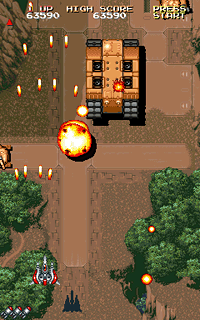 Interestingly, Daioh Gale, the sample shooter included with Dezaemon, is loosely
based on Daioh, an arcade game originally developed by Athena and released in 1993
(picture on the right).
Although the space-fighters featured in both games look relatively the same, the gameplay and
weapon system are quite different, and, in the end, Daioh Gale is a lot more straightforward
and conventional than its arcade parent. As a side note, the Playstation version of
Dezaemon features a sample game called "Daioh Gale ver.2" (an improved version
of Daioh Gale), and Dezaemon 2 (released for the Sega Saturn in 1997)
includes a 3D shooter called "Daioh-P" among other sample games, such as
Biometal Gust, a remix version of the horizontal shooter Biometal originally
released by Athena for the Super Famicom in 1993.
Interestingly, Daioh Gale, the sample shooter included with Dezaemon, is loosely
based on Daioh, an arcade game originally developed by Athena and released in 1993
(picture on the right).
Although the space-fighters featured in both games look relatively the same, the gameplay and
weapon system are quite different, and, in the end, Daioh Gale is a lot more straightforward
and conventional than its arcade parent. As a side note, the Playstation version of
Dezaemon features a sample game called "Daioh Gale ver.2" (an improved version
of Daioh Gale), and Dezaemon 2 (released for the Sega Saturn in 1997)
includes a 3D shooter called "Daioh-P" among other sample games, such as
Biometal Gust, a remix version of the horizontal shooter Biometal originally
released by Athena for the Super Famicom in 1993.
|
G
O
O
D
I
E
S
|
|
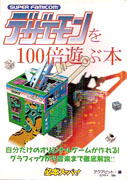
Japanese Guidebook
|
|
|
O
M
A
K
E
|
|
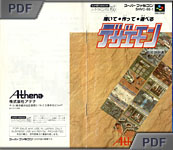
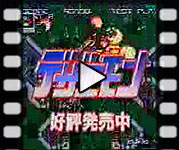
|
|
|
Click on picture to enlarge |
|
|
|
LK

|
|
Add your Pov here !
|
P
O
V
s
|
|
I was first introduced to the Dezaemon series with Dezaemon Plus
for the Playstation, which comes with a decent library of fan-made shooters.
This Super Famicom version is virtually identical, only lacking the extra
usermade shooter library and some of the neat sprite effects. The interface is easy
to use, especially the music editor which allows you to quickly compose and arrange
very entertaining and catchy music tracks. Sadly, a limited amount of data can be
saved onto the cartridge (it is not possible to load/export this data as far as I know).
So it seems that the only way to share your home-made shooter with others is to lend them
your cartridge... That is the only caveat, really, and it must have been rather frustrating
back in the days (and the on-board RAM is rather small). Except for this limitation, the
built-in game is very enjoyable and the editor somewhat educational, showing players how
2D games used to be made. All in all, Dezaemon is an unique and fun game (not for
everyone though), but I'd advice you to hunt down Dezaemon Plus for the
Playstation (which makes this Super Famicom version seem kind of redundant),
or the excellent Dezaemon 2 for the Sega Saturn.
|
|
|
|